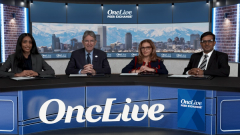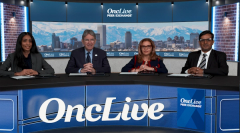
Investigational Allo-HSCT for Advanced Hematologic Malignancies
The expert panel shares emerging data on an engineered, allogeneic cell-based therapy administered as part of conditioning for allo-HSCT in patients with relapsed, refractory, or high-risk hematologic cancers.
Episodes in this series

This is a video synopsis/summary of a Peer Exchange featuring Miguel-Angel Perales, MD; Nelli Bejanyan, MD; Amandeep Salhotra, MD; and Arpita Gandhi, MD, MS.
The panel discusses the Orca-Q product, a cellular therapy developed by Orca Bio for nonmalignant disorders, which differs from the Orca-T graft used in malignant settings. The Orca-Q product utilizes naive T-cell depletion from the peripheral blood stem cell graft while retaining the memory T-cell population, which confers graft-vs-leukemia (GVL) effects and prevents infectious complications.
The phase 1 dose escalation study has been completed, reaching the target memory T-cell dose level of 100 million cells/kg, and will be expanded.
The Orca-Q product is being tested in both matched donor and haploidentical transplant settings. Data on 33 patients who underwent haploidentical transplantation after myeloablative conditioning was presented at the 2023 American Society of Hematology Annual Meeting & Expo. The Orca-Q graft allows for haploidentical transplantation without the use of post-transplantation cyclophosphamide, potentially reducing complications such as hemorrhagic cystitis, cytopenias, and high-dose chemotherapy-related issues. The study reported low rates of chronic graft-vs-host disease (GVHD; no GVHD at 1-year follow-up), acute GVHD (less than 5%), and cytokine release syndrome. The panel expects the study to be expanded, providing results in both matched donor and haploidentical settings.
Video synopsis is AI-generated and reviewed by OncLive® editorial staff.






































